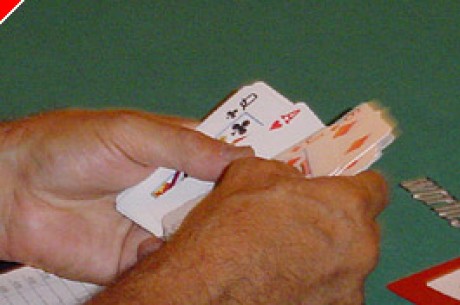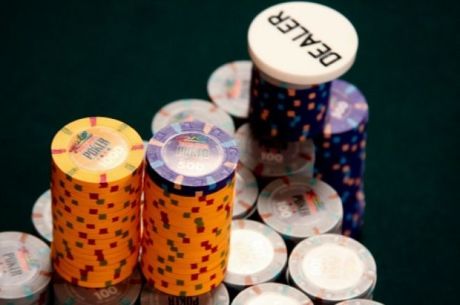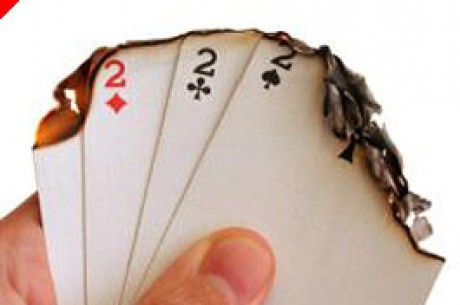Stud Poker Strategy: Dropping Down to Raise it Up

There's a lot of ego in poker; it's one of the motivations for many players. We poker players are a combative and competitive lot. We prove how tough and "bad" we are by the games we're in. The higher the stakes, the better players we must be.
However, there is absolutely no value to being a losing player in the toughest game. If you think there is some value in this, you are delusional. Being a $1,000/$2,000 game loser means you're a loser. You are worse off, and potentially much worse off, than a winner in a $1/2 game.
Sadly, some poker players have devastated their bankroll because they couldn't humble themselves to drop down in stakes. But that's often the best course of action to take. Here's a likely scenario to consider:
You're a winning $20/40 stud player. You have the records to prove it. Eighteen months and you've averaged one big bet an hour. Good for you.
Your playing bankroll stands at $40,000. It's a tidy sum. You're even thinking of moving up to $75/150. Wouldn't that be sweet? If you kept up your winning ways you could go from being a $40/hour winner to a $150/hour winner. And maybe you could move out of your mother's basement. Oh, baby, wouldn't that be nice.
Gradually, you start to lose at your $20/40 game. It's not anything serious, of course. You've ridden out losing streaks before. Three weeks, four weeks, even a month or so – you've seen it all.
Or so you thought.
It's been six weeks and now you're down $8,000. Sure, some of it is due to the two or three big hold'em tournaments that you entered and didn't win. And there were a couple of $50/100 mixed games you tried out – unsuccessfully. And that disastrous home game of no-limit. Uggh. But still. Your $40,000 is now $32,000.
And then something else happens. The losing streak starts to mess with your head. You find yourself thinking about your stack size at the table – not betting or raising when you know you should. You get split queens in early position, fire in a raise, only to be called by an ace. On fourth street the ace checks. And you check behind him, afraid he's setting to trap you with a check-raise. But you know this guy. You know he's not a tricky player. And yet, you're afraid. This bums you out.
You stay extra long on Saturday night – play through Sunday until the action completely dries up early Monday morning. You've played long sessions before, but never like this. And you really zombied out toward the end, dropping back $2,300 — $800 more than you had won earlier in the session.
No $75/150 for you any time soon. Your bankroll is down to $18,500.
You're a smart player. You know what's going on. You're in a tough spot and need to figure it out. So you take a week off. It's summer. You go to the beach and exercise more than usual. You think about your play; you relax and think of nothing but getting laid.
You go back to the poker room after six days. OK, it's not quite a week. Still, you're refreshed. You sit back down in your $20/40 game. But it's no good. You're thinking about the money all the time – nervous that you'll blow the rest of your bankroll. After all, you blew through more than half of it already. Maybe you'll go through the rest. Then what would you do? You'd have to go straight and get a real job. Uggh.
You know what. It's time to drop down. Put your ego aside and play lower.
Is the $10/20 game any good? Are there any fish in the games? How about $5/10? How beatable is that? You take a look. You know you can take those weakies. But still, what will the other players think? They'll know that you're dropping down. You'll know. How can you lose face like that?
No matter. Suck it up, buddy. Forget what the neighbors will think. When it comes right down to it, no one cares. Really. No one cares about your game but you (and maybe your mom – who is as eager for you to leave as you are). So forget the "other people." Worry about yourself.
You need to rebuild your bankroll and start winning again. You need to be able to put money aside and just play strategically correctly. A lower stake allows you to do that. Plus, these $5/10 or $10/20 players don't know you nearly as well as the $20/40 regulars. You'll be better able to manipulate them (assuming you don't credit them with too much skill) and take advantage of what will be obvious mistakes on their part.
You've got to be wary of some things in the lower-stakes game. You can't treat it like it's unimportant. You can't assume that just because you're some hotshot $20/40 pro that you're guaranteed winning hands in the lower-stakes games. Some players do, you know. They feel that they're just entitled to pots because they're playing so low. You're not. You have to earn the money the same as you do at $20/40. So don't screw around. It's work and the money is real.
Forget your ego; check it at the poker room door. Don't feel sheepish. Don't avoid people. Don't look around while you're sitting in $10/20 and say, with your eyes or your body language, "I don't really belong here." Forget all of that. You're there to make money – same as everybody else.
Get down to business. Drop down in stakes and play your best game. And realize that one big bet an hour at $10/20 will add more to your bankroll than no big bets an hour at $20/40.








